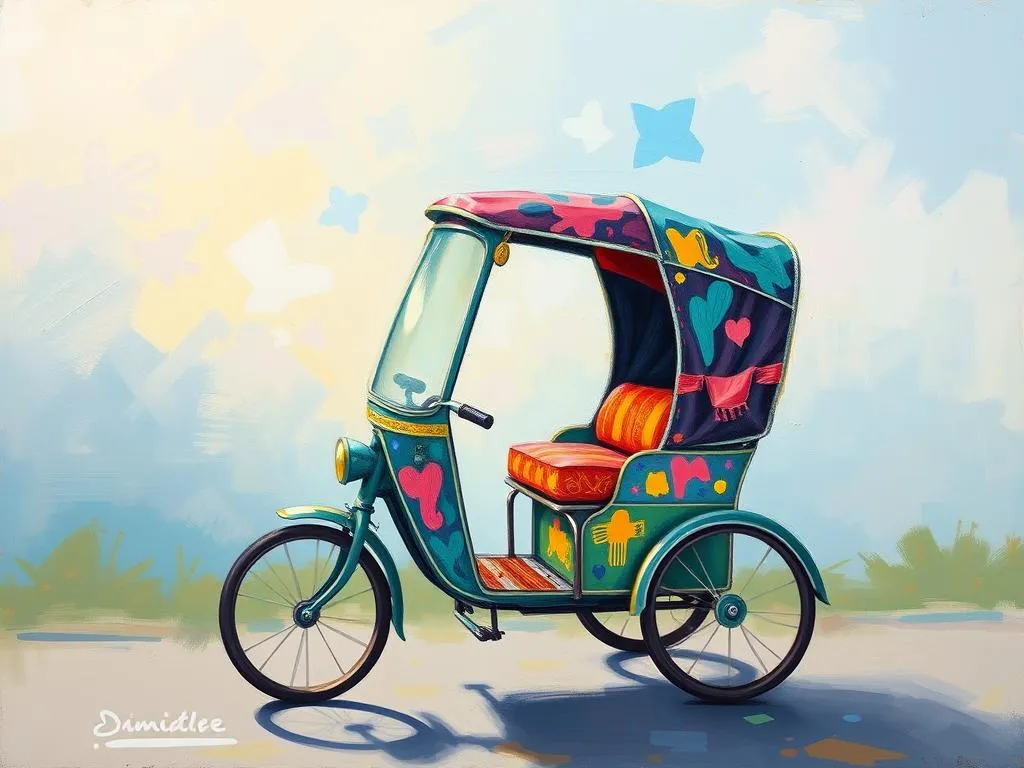
Introduction
Dreams have fascinated humanity for centuries, serving as windows into our subconscious mind and revealing hidden emotions, fears, and desires. Among the myriad of dream symbols, the rickshaw stands out as a unique and culturally rich representation of our life’s journey. In many parts of the world, a rickshaw symbolizes both transportation and service, but it also evokes deeper meanings tied to freedom, burden, and connection. Understanding the symbolism behind a rickshaw dream can provide valuable insights into our waking lives, prompting reflection on personal circumstances and emotional states. This article aims to explore the various interpretations of rickshaw dreams and encourage readers to delve into their own experiences.
Symbolism and Meaning
At its core, a rickshaw symbolizes the journey of life, often reflecting the path we take and the choices we make. The rickshaw itself, typically pulled or pedaled by someone else, can represent feelings of being guided or supported by others. This can signify a reliance on friends, family, or circumstances in navigating life’s challenges. Conversely, if the dreamer is in control of the rickshaw, it may suggest a sense of empowerment and self-direction in their personal journey.
The driver of the rickshaw in your dream may also hold significance. If the driver is familiar, it could symbolize a trusted figure in your life, while a stranger might indicate the need to trust in the unknown or embrace new experiences. The condition of the rickshaw—whether it’s well-maintained or broken down—can reflect your current emotional and mental state. A well-functioning rickshaw may symbolize progress and clarity, while a damaged one could denote feelings of stagnation or anxiety.
Additionally, the environment surrounding the rickshaw can add layers of meaning. A bustling city may represent the challenges of modern life, while a serene countryside setting could suggest a desire for tranquility and escape from chaos. Each element in the dream, from the scenery to the passengers, contributes to an overall narrative that reflects the dreamer’s waking life.
Key Scenarios and Variations
Rickshaw dreams can take on various forms, each carrying its unique implications. One common scenario is dreaming of riding in a rickshaw. If the ride is smooth and enjoyable, it may indicate that you feel comfortable and supported in your current path. On the other hand, if the ride is bumpy or chaotic, this may suggest anxiety or dissatisfaction with the direction your life is taking.
Another variation involves the dreamer pulling the rickshaw. This scenario often symbolizes a feeling of burden or responsibility. It can indicate that you are carrying the weight of others’ expectations or responsibilities, possibly feeling overwhelmed by your commitments. Reflecting on whether you feel empowered or exhausted in this role can provide insights into your waking life’s pressures.
Dreaming of being the driver of a rickshaw can represent control over your life’s direction. This could signify that you are actively making choices and steering your path. However, if you feel lost or struggle to navigate, it may point to uncertainties or a lack of confidence in your decision-making abilities.
The presence of passengers in the rickshaw can also alter the dream’s meaning. If you’re traveling with loved ones, it may symbolize a shared journey or collective goals. Conversely, if the passengers are strangers, this could signify feelings of alienation or the need to connect with new people and experiences.
Lastly, the destination of the rickshaw can change the dream’s narrative significantly. Arriving at a joyful event might indicate progress, satisfaction, or a positive change in your life. In contrast, reaching an undesirable location could symbolize fears or obstacles that you are currently facing.
Real-Life Connections and Takeaways
Understanding the symbolism of rickshaw dreams can lead to profound self-reflection and personal growth. As you consider your own rickshaw dream, take a moment to think about what aspects resonate with your current life situation. Are you feeling supported, or do you feel the weight of responsibilities? Are you navigating your path with confidence, or do you feel lost?
To gain deeper insights, consider journaling about your dream. Write down every detail you remember—the setting, the passengers, the state of the rickshaw, and your emotions during the dream. Reflect on how these elements relate to your waking life. For instance, if you’re feeling burdened in your dream, think about whether there are areas in your life where you feel overwhelmed. Are there responsibilities you can delegate, or are there expectations that you can address?
Moreover, think about how the rickshaw’s symbolism relates to your goals and aspirations. Are you moving toward your desired destination, or do you feel like you’re stuck in a cycle? Identifying these feelings can help clarify what changes you might need to make in your life to feel more empowered and fulfilled.
Remember that dreams are deeply personal, and while this analysis can provide a framework, your unique experiences and emotions will ultimately shape the meaning of your rickshaw dream. Embrace the opportunity to explore these symbols further, as they can help illuminate your path and guide you toward a more intentional life.
In conclusion, rickshaw dreams serve as important symbols of our journeys—both literal and metaphorical. They encourage us to reflect on our choices, responsibilities, and relationships while providing a canvas for exploring our emotions and aspirations. By engaging with these dreams thoughtfully, you can uncover valuable insights that resonate with your waking life, fostering personal growth and deeper understanding. As you navigate your own journey, take the time to listen to the messages these dreams convey; they may hold the key to unlocking your true potential.







